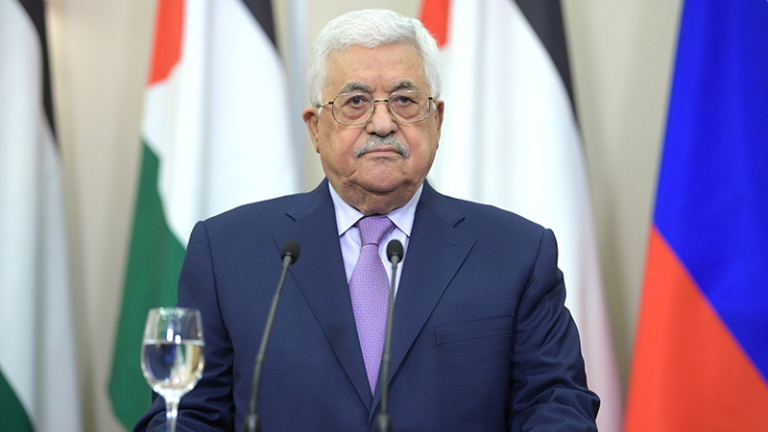
Palestinian President Mahmoud Abbas’s health has been the subject of speculation for some time, especially since he has been afflicted by both prostate cancer and heart disease. With Abbas having now reached 87 years of age, it is natural for Palestinians and others to worry about the very real possibility of his leaving the presidency with no agreed-upon replacement to steer the difficult ship of internal Palestinian affairs and relations with regional and international actors. Abbas, who has been president of the Palestinian Authority (PA) since his predecessor Yasser Arafat’s death in 2004, has had a profound influence on Palestinian life. But he has also failed to change the reality of Israel’s occupation of Palestinian land and its control over more than five million Palestinians in the occupied West Bank and the besieged Gaza Strip. Whoever ends up replacing Abbas is therefore likely to face significant pressure to make serious changes in Palestinian political institutions—which are slowly dying under their current leader—and in Palestinians’ perceptions of what the future will bring for their cause.
Abbas’s Legacy
Abbas’s declining health is critical to the policies and politics of Palestine, Israel, the United States, and many other interested parties. Although his political life has been full of ups and downs, his commitment to a negotiated resolution of the struggle with Israel has been steadfast. But this position has proved to be a source of criticism among Palestinians of various political shades, especially supporters of Hamas. Abbas’s insistence on the use of diplomacy and negotiations to reach an accommodation with Israel, as opposed to Arafat’s approach of simultaneously “bearing an olive branch and a freedom-fighter’s gun,” has gradually deprived him of the popularity that any president would need to successfully lead the Palestinians out of their current weakened position vis-à-vis Israel.
Abbas’s insistence on the use of diplomacy and negotiations to reach an accommodation with Israel has gradually deprived him of the popularity that any president would need to successfully lead the Palestinians out of their current weakened position vis-à-vis Israel.
President Biden’s recent visit to Israel and the West Bank did not make things any easier for Abbas. Both ordinary Palestinians and Abbas’s potential replacements expressed their disappointment with the visit. Biden arrived with promises of economic relief for the Palestinians, but without even a hint that he would be willing to use his position to invite both parties to the negotiating table for a just settlement of the Palestinian-Israeli conflict. To be sure, the naked truth about American policy toward the Palestinians was revealed during Biden’s visit, which saw no apologies offered for the rather unsurprising US position that now is not an opportune time to jump-start the peace process.
At the very least, Palestinians had expected Biden to roll back the egregious damage caused by the destructive duo of former US President Donald Trump and former Israeli Prime Minister Benjamin Netanyahu, who thought that they could rewrite the rulebook for Arab-Israeli conflict resolution. During his presidential campaign, Biden promised to undo some of the damage caused by the Trump-Netanyahu alliance, including reopening the US Consulate in East Jerusalem and the Palestine Liberation Organization (PLO) office in Washington. Both promises were ignored while the Biden Administration instead mistakenly hoped that Palestinians would be content with economic and humanitarian assistance as a substitute for a guarantee of political rights.
However, the vigor with which Abbas met Biden was surprising, especially given the hectic preparations leading up to the visit. Even more surprising was the fact that following the Abbas-Biden summit in Bethlehem, the Palestinian president undertook a diplomatic trip to Romania and France without the rest one would think necessary for a man his age. His tour was likely an attempt to make himself appear relevant, and perhaps also an effort to seek an honest broker to replace the United States in its role of mediator between Israel and the PA.
Israel Escapes All Criticism
It seems that regardless of whether the US President is Republican or Democrat, Israel continues to be the United States’ most favored foreign partner. Israel is regularly showered with an abundance of tender, almost loving concern, along with a hefty package of annual military assistance that exceeds $4 billion and a solid pledge to help maintain Israel’s military superiority in the Middle East and beyond. Because of this unconditional US support, Israeli leaders feel no pressure to budge in their standstill position on the peace process. Meanwhile, the past few years have demonstrated the dysfunctionality of the Israeli system of governance, with the survival of any given government dependent on a handful of right-wing Knesset members who support settlement policy. This has provided a convenient pretext for Israel to avoid engaging in peace negotiations with the Palestinians, though in truth the Israeli position remains one of refusal regardless of what type of government is in office. Further complicating the matter, the United States and other countries continue to insist that the Palestinians must be both understanding and accommodating in the negotiation process, despite their being the aggrieved and militarily occupied party.
The United States and other countries continue to insist that the Palestinians must be both understanding and accommodating in the negotiation process, despite their being the aggrieved and militarily occupied party.
In addition to facing an airtight US-Israel alliance, Palestinian contenders for Abbas’s position also confront a daunting political division between the West Bank and the Gaza Strip, which are ruled by rival administrations: the PA in the former and Hamas in the latter. It is a forgone conclusion that no Palestinian presidential and parliamentary elections will be held in the occupied West Bank and the besieged Gaza Strip for fear that Hamas might win. Hamas’s legislative win in 2006 nearly caused the PA’s collapse, and the “solution” was to split the governance of the two territories between the two political organizations. The PA is unlikely to repeat the same mistake again.
The Palestinian Electoral Process
In a meeting in Ramallah toward the end of July, Speaker of the Palestine National Council (PNC) Rawhi Fattouh informed this author that the PLO now has a process in place should Abbas—who is also PLO chairman—become incapacitated or die. Fattouh indicated that President Abbas has, with the approval of the PLO’s Central Council, approved the transfer of presidential power over the Palestinian Legislative Council in such a situation to the speaker of the PLO’s National Council (PNC). Fattouh emphatically noted that because of a constitutional provision, the former speaker of the Palestinian Legislative Council, who is a Hamas member, will not be able to become the interim president of the PA.
If Abbas dies in office without designating a successor, the choice of PLO chair and, in turn, the president of the PA will fall on the shoulders of the PLO’s Central Council. Given that the political party Fatah, along with its independent allies, forms a majority in the PLO’s Central Council and its Executive Committee, the newly-selected head of Fatah will presumably become the party’s nominee for PLO chair. The chair of the PLO would then become the president of the PA as well. There are those who regret the weakening of the PLO in favor of the PA, since the PLO is the main source of political legitimacy for the Palestinians and encompasses the majority of Palestinian political factions, with the notable exclusion of Hamas. The PLO is also the umbrella organization representing Palestinians worldwide.
Three Contenders to Replace Abbas
Three candidates currently stand out as likely contenders to assume the leadership of the PLO and the PA, though there are few fundamental policy differences among them. The first, and lately the most visible, candidate is Hussein al-Sheikh. Al-Sheikh is known for his meteoric rise in the ranks of the PLO, having been appointed in February 2022 to the Executive Committee of the PLO, the organization’s highest decision-making body. Shortly thereafter, he was made secretary general of the committee, a post that was held by the late Saeb Erekat. Many viewed these appointments as a sign of the Palestinian political establishment’s favoring al-Sheikh over other contenders.
Currently, al-Sheikh is also the head of the PA’s General Authority of Civil Affairs and of its Coordination and Cooperation Committee. In these capacities, al-Sheikh has worked closely with Israeli officials, and some Palestinians view his ties with Israel as being too close for comfort. However, one major factor that could help al-Sheikh ascend to the highest echelons of power within the PLO is the support that he enjoys from Majed Faraj, head of the Palestinian General Intelligence Services. Nevertheless, popular opinion seems to be largely opposed to letting al-Sheikh attain the presidency.
The second main contender for chair of the PLO and president of the PA is Jibril Rajoub, secretary general of Fatah’s Central Committee and former chief of Preventive Security in the West Bank. Rajoub was tasked with developing a common platform to bring Hamas into oft-postponed elections in the West Bank and Gaza. Rajoub is known for his bluntness and machismo, and notably clashed with former PLO Chair Yasser Arafat who, at the time, stripped him of his post as head of Preventive Security. Rajoub also reportedly has a power base in Hebron and Ramallah, and still holds sway among some elements of Palestinian security forces. One potential obstacle in Rajoub’s path is the fact that he is not a member of the PLO’s executive committee. This does not represent a legal hurdle to his ascension to the presidency, for which he is eligible as long as he is first elected as head of Fatah, but does mean that he may not receive much support for his candidacy from within the PLO.
Hussein al-Sheikh, Jibril Rajoub, and Mahmoud Aloul—currently stand out as likely contenders to assume the leadership of the PLO and the PA.
If the race between al-Sheikh and Rajoub turns sour, the compromise candidate would most likely be 72-year-old Mahmoud Aloul. In 2017, Aloul was elected deputy chair of Fatah’s Central Committee, thereby placing him front and center in the party that dominates the PA and its security forces. In 2018, Abbas reportedly told members of the Fatah Revolutionary Council that Aloul was his preferred candidate to succeed him as chair of Fatah. Aloul is the eldest of the three main candidates, and in the 1970s was involved in Palestinian military activities. His support comes primarily from those in the Nablus area, as well as from people who do not like either al-Sheikh or Rajoub. Nevertheless, Aloul, who belongs to the old guard of Palestinian leadership, is expected to pursue relatively similar policies as Abbas if elected to replace him. For example, Aloul shares Abbas’s strategy of sticking to “popular resistance” rather than armed struggle against Israel.
More Similar Than Different
Many observers have predicted the demise of Abbas due to his failing health. However, the elderly president has cheated death many times, and indeed, his visit to Europe on the heels of Biden’s visit would likely have exhausted even much younger officials. All three candidates vying for the presidency of the PA and the PLO are younger than Abbas, and may therefore inject new vitality into the office. However, not one of the current contenders for the PA presidency is expected to deviate much from Abbas’s policies toward Israel and the United States. Nevertheless, their leadership style would certainly reflect their personalities, with al-Sheikh being the most diplomatic, Rajoub the bluntest, and Aloul a mirror image of Abbas, but tougher in terms of his active encouragement of popular mass resistance to Israel’s occupation.
The selection of a new president is projected to be tense, and may at times involve clashes among the candidates’ supporters, especially those of al-Sheikh and Rajoub. Nevertheless, the internal PA and PLO elections will almost certainly be held in peace. In the end, the style and power base of each candidate will ultimately determine who will succeed Abbas, even though the PA’s general political direction will likely remain unchanged.

